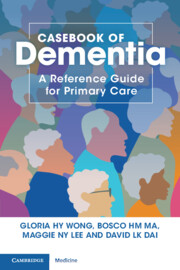I am honoured to introduce this Casebook of Dementia, which serves as a valuable resource to promote the important role of primary healthcare for dementia. The case studies share practical experiences and insights gained from the unique healthcare setting of Hong Kong, and can benefit healthcare professionals and caregivers alike.
In recent years, the global community, including esteemed organisations like the World Health Organisation and Alzheimer’s Disease International, has recognised dementia as a pressing public health concern. It is a chronic disease that requires long-term care and support. However, the problem of over-specialisation persists which hinders effective care delivery.
To address this problem, community-based primary healthcare models for dementia have been developed and tested, providing useful and valuable insights. By fostering knowledge exchange and reciprocal learning between the East and West, we can expedite progress in this field. This book serves as a guide that emphasises on community engagement and carer support, through early intervention enabled by primary healthcare.
Why advocate for primary healthcare in the management of dementia? I have openly expressed my concerns regarding the numerous challenges faced by individuals living with dementia and their caregivers. Limited resources and inadequate training of healthcare professionals often hinder access to appropriate care and support services. Family caregivers shoulder a significant burden, resulting in high levels of stress and burnout. By focusing on primary healthcare, we can address these challenges and alleviate the difficulties faced by those living with dementia and their families.
Primary healthcare plays a pivotal role in dementia care, serving as the gateway to comprehensive and coordinated approaches for early detection and effective management. Primary healthcare providers have crucial responsibilities, including identifying individuals at risk in a timely matter, facilitating interdisciplinary care, and making specialist referrals when necessary. To ensure that primary healthcare providers fulfil these roles effectively, both training and education are essential.
This book serves as a valuable training tool for primary healthcare providers, with real case examples to facilitate clinical learning. The book also offers practical assistance in using and interpreting cognitive and other screening assessments, highlighting collaborative care and the importance of interdisciplinary teams which comprise primary healthcare physicians, social workers, occupational therapists, and family caregivers. The provision of comprehensive care addressing the physical, emotional, and social needs of individuals and their caregivers is at the heart of this book.
The cases described and the primary healthcare model suggested in this book have been developed and tested within the unique context of Hong Kong by dedicated professionals from the Hong Kong Alzheimer’s Disease Association. Hong Kong’s specific features, such as strong filial piety values and the ongoing pursuit of ‘Family doctor for all’, contribute to the relevance of this model. Hong Kong benefits from a wealth of high-quality medical, allied health and social care professionals, as well as robust community support services. While each country and city has its own distinct primary healthcare context, the educational materials produced in Hong Kong have relevance to contexts both in the East and in the West, the rapidly ageing societies, and healthcare systems where the lack of human resources made innovation and collaboration an imperative for quality dementia care.
I am delighted to witness the fruition of this important work, made possible by the support of the Lee Hysan Foundation and the dedication of my long-term partners and friends from the Hong Kong Alzheimer’s Disease Association. Developing a workable model of community dementia care in Hong Kong has been a journey spanning many years, and requires concerted efforts from patients, healthcare professionals, policymakers, and the community at large to significantly improve the quality of life for people with dementia and their caregivers.
I wholeheartedly encourage readers from around the world to make the best use of this book to improve the provision of comprehensive care and support services to patients and their caregivers.



